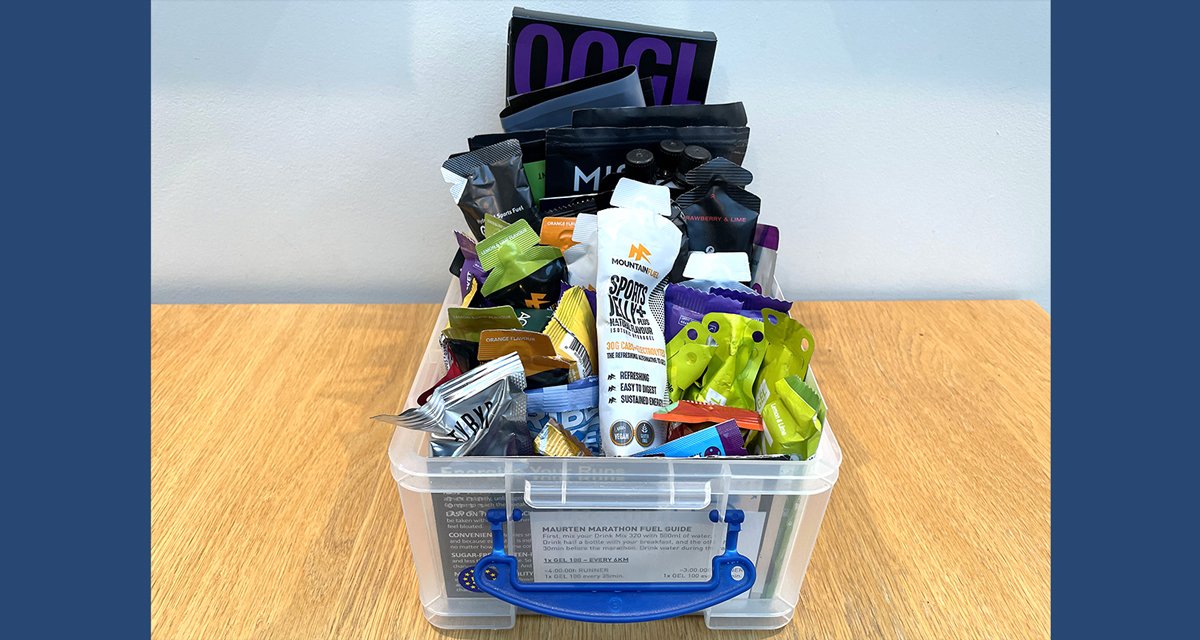Fueling a Marathon and Scaling ‘The Wall’
The question I get asked most this time of year is, what do I recommend as a fueling strategy for a marathon?
Here are my thoughts in one place. But before we go any further, a little about WHY you would need that extra fuel in the first place.
In any endurance event you generate energy from a mix of carbohydrates and fats. And as the intensity increases, the amount of energy derived from carbs will also increase. For most events from the marathon downwards, the vast majority of your energy needs will be met from carbs. For a marathon however, carbs will typically meet 80%+ of your energy needs (although this varies person to person).
But here’s the rub, you ONLY HAVE 2,000 - 2,800 calories of carbs in your body, stored as glycogen and glucose. And you’ll typically need more than that to complete a marathon.
That’s where ‘The Wall’ comes in. If you run out of carbs, you run out of energy and then you’ll suddenly feel very tired. That’s what runners call ‘hitting The Wall’. It’s not fun!
The good news is you can avoid the worst of ‘The Wall’ by taking on fuel as you run. Now I can’t promise fueling will solve all your fatigue issues ‘cause guess what, running 26 miles is really tiring but it might help you along the way.
How do you fuel a marathon?
Here’s a simple answer, based on science and my own experience.
BIG CAVEAT ALERT: everyone is different so what works for one athlete may NOT work for another. Therefore, when training, try different nutrition strategies
It’s an old adage but never do something new in a race. By the way, that’s not just for fuelling, that goes for every aspect: shoes, clothes, what you eat before the marathon.
In the days before the marathon, increase your carbohydrate intake: Do this over a few days to help build your glycogen stores. Don’t forget to make sure you're well hydrated too. A 2021 Frontiers in Physiology study recommends 8 - 12 grams of carbs per kilogram of bodyweight each day for the two days before the race.
On the day, eat breakfast and have a drink well before the race starts: Low fibre foods with slow release carbs (like porridge) are good. Also have a gel (or banana if you prefer) 30 minutes before the race to give you a bit of immediate sugar. The same study suggests you should eat 1 - 4 grams of carbs per kilogram in a pre-race meal before you start.
During the race, try to have 2 - 3 gels per hour after the first 30 minutes to an hour: More is more if your stomach can cope with it and you can carry all the gels. Most scientific thinking on this boils down to having 60 - 90g of carbs for runs that are longer than 90 mins. If you’re opting for gels, try those containing both glucose/maltodextrin and fructose, as they’re absorbed by different pathways in the gut and can make them easier to stomach. Drink to thirst. Which simply means drink if you’re thirsty and don’t if you’re not. Take care drinking out of cups while running, I’ve nearly drowned doing that. And if you drink out of a bottle, squeeze any remaining water onto the floor - the bottles can only be recycled if they’re empty.
Post race: Drink a 4 : 1 ratio carbohydrate/protein drink to help recover. Chocolate milk is ideal. And then have a full meal.
Some races provide gels and/or energy drinks, which can save you having to carry your own (e.g. the London Marathon provides Lucozade gels and energy drink). If you’re planning to rely on what’s on offer, then it’s crucial that you try it in advance. And also that you’re confident that you can get the gels and/or drink when you want them, as not all water stations on route may stock them.
So, what do I do in practice?
For what it’s worth, this is my marathon fueling approach:
The days before: increase my carbohydrate intake over the three days before the race and eat a large (but not so huge that I feel bloated) bowl of pasta the evening before. I also drink 500ml of water with Precision Hydration electrolytes the night before on top of everything else I’ve drunk.
On the day: I eat porridge and drink a coffee PLUS 500ml of water with electrolytes at least 2 hours before the start. Believe me, the water takes that long to work through my system (something I’ve tested)! I’ll aim to have another coffee and a banana about 30 minutes before the start.
During the race: I try to take a gel about every 30 minutes which amounts to 4 gels, based on my marathon finishing times. I’ll probably have a caffeine gel as my last one. I’ve tended to use Maurten gels but am experimenting with SIS Beta Fuel as it has more carbs. I also like Mountain Fuel.
Post race: I eat and drink anything the race organiser provides and have a drink containing Mountain Fuel Recovery Powder.
I’ll just leave you with a couple of points….
Firstly, to run your best marathon you need to fuel properly BEFORE AND DURING the race. Proper fueling AFTER will massively help your recovery.
And secondly, you need to practice your fueling on your long runs. What works for me, or your friend may not work for you. Believe me, you don’t want to find that out on race day when you hit ‘The Wall’ or the portaloos mid race!

